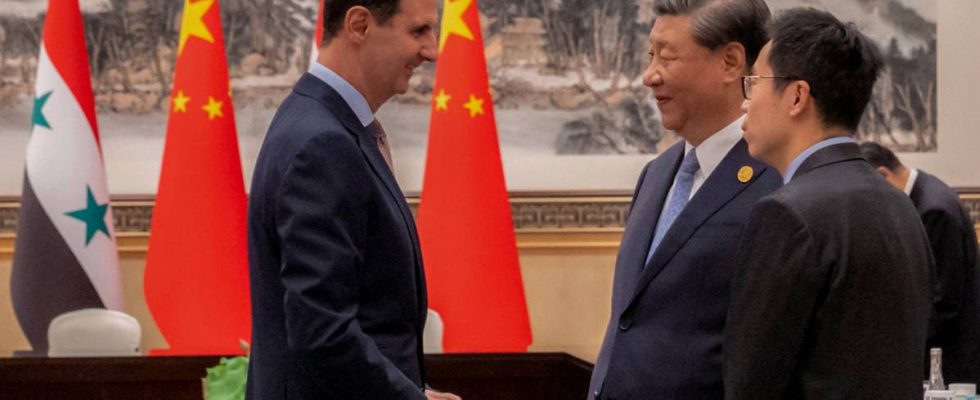It has been almost 20 years since Bashar al-Assad last set foot in China. The Syrian dictator was received by Xi Jinping last Friday, on the sidelines of the Asian Games. An unprecedented meeting at the end of which Beijing and Damascus established a “strategic partnership”, particularly on the reconstruction of Syria in ruins after more than ten years of war.
A blow more diplomatic than economic for Damascus, but also for Beijing which thus shows the whole world that it “is capable of discussing with everyone”, analyzes for 20 minutes Antoine Bondaz, researcher at the Foundation for Strategic Research (FRS), specialist in China.
A boon for China
Although it does so much more discreetly than Russia, China has never hidden its support for the Syrian regime, particularly at the UN Security Council, by regularly abstaining from the vote on resolutions antagonizing the power in place, following the example of Moscow. So why wait until September 2023 to receive the Syrian dictator?
China is benefiting from the rapprochement already made with Damascus by various countries in the Middle East, according to Nicolas Tenzer, specialist in strategic and international issues and teacher at Sciences Po. Syria indeed rejoined the Arab League last May. “This creates an opportunity with the concordance of the Middle East powers,” he explains. Indeed, China would not have exposed itself in this way if certain States had not taken the lead with Syria. “She would not have done it first,” insists Antoine Bondaz, “she waited for the dynamic to begin.”
The other occasion is the war led by Russia in Ukraine. “The context accentuates the attempt by dictatorships to join forces to tell the Western world that they have nothing to do with its convictions, its international law,” summarizes Nicolas Tenzer. With its open war, Moscow has opened the door to China “which does not have its conduct dictated by the Kremlin”, specifies the professor at Sciences Po. Nevertheless, “Russia’s attitude towards international law has allowed China to gradually free itself from the forms of caution it once had,” he adds.
A message sent to the rest of the world
This partnership established between Damascus and Beijing allows China to position itself internationally. “Because the primary interest of this rapprochement is precisely not economic, but diplomatic and strategic, Syria is not an interesting producer of hydrocarbons and Beijing has no interest in putting thousands into the reconstruction of Syria” , develops Antoine Bondaz. Behind these pretexts, receiving Bashar al-Assad above all allows Beijing “to send a message and show that China is the only permanent member of the UN Security Council capable of speaking to everyone, even to “pariah” countries. “, like Syria, unlike the West,” continues the researcher. She positions herself as a real power, a real mediator.
In addition to Western countries, it is mainly to developing States that this message is addressed. To summarize it roughly: rather than talking with the great lesson-giving democracies, talk with us. “In the face of an international situation full of instability and uncertainty, China is ready to continue working with Syria, to support each other, promote friendly cooperation, and jointly uphold international fairness and justice,” in other words, declared the strong man from Beijing, emphasizing that the two countries “have stood the test of international changes”.
But for Antoine Bondaz, it is also a speech aimed at the Chinese population, to convey the idea that, unlike the United States, Chinese power “is focused on reconstruction and not on war diplomacy, that the Chinese power is more effective, more virtuous.” Indeed, according to the researcher, the Chinese Communist Party must “permanently legitimize itself” in the eyes of its population.
A common front
The fact remains that there is indeed a scent of the Cold War running through international relations with a bloc of dictatorships or authoritarian regimes and a democratic bloc. “China is a genocidal regime” and “it is the very logic of impunity”, recalls Nicolas Tenzer. Even if for years she knew how to buy herself a presentable image, her face changed with the coming to power of Xi Jinping who “has accentuated the logic of repression of the rules of international law, today, the idea that China is more reasonable than Russia is obsolete,” warns Nicolas Tenzer.
With the rapprochements in China and Syria, but also Russia and North Korea, Iran and Saudi Arabia and relations which intersect, would there not be a sort of friendship between dictatorships who is establishing itself on the international scene, facing the Western democratic powers? “Yes there is a conjunction of interests of all the dictatorships which want to destroy international law, war crimes, human rights… So any form of contact between two dictatorships is in the logic of things”, confirms Nicolas Tenzer.
A bloc that helps each other, without having a leader. “Authoritarian regimes sanctioned by the international community have always tended to operate among themselves,” specifies Antoine Bondaz. However, China has no interest in taking the role of leader of this league of tyrants. “Getting closer, yes, but not to the detriment of its relationship with Western regimes. China is the country that is capable of receiving Bashar al-Assad a few months after Emmanuel Macron,” he illustrates.

